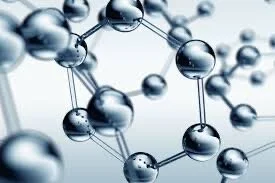WHAT ARE PEPTIDES?
In the most basic sense, peptides are the building blocks that make up protein. When amino acids link together, the chain they form is called an amino peptide. When peptides link together, they become the basis for all protein. The most vital protein within your skin is Collagen.
Collagen lies beneath the epidermis in what’s known as the “dermis”, a layer made of nerves, blood vessels, fats, elastin (that’s what makes your skin stretchy), and collagen, LOTS of collagen. Collagen peptides for skin make up about 80% of your dermis. This is what gives your skin that firm, smooth, youthful, radiant glow we all strive for. When you’re young, you produce collagen at a very high rate. However, as you age, that rate begins to slow. After age 20, your body produces an average of 1% less collagen peptides for skin each year, stopping production entirely around age 40. Not great news. What’s more: your existing collagen begins to break down, known as “fragmenting”. This occurs due to a number of reasons, some of which we can control—and unfortunately, some that we simply can’t.
The most prominent reason for collagen breakdown: AGING.
However, there are behavioral and environmental reasons your collagen might break down, and these are things you can control. Exposure to UV radiation—whether that be a result of tanning beds or simply leaving the house without applying sunscreen—can break down collagen. Smoking can also lead to its deterioration (as if you needed another reason to quit that habit).
Bottom line: As your skin continues to stretch, new collagen isn’t available to maintain the firm, smooth look it once had. That’s where wrinkles come from.
Without peptides, there’s no collagen, and without collagen, there’s no defense against aging: peptides = proteins like collagen = anti-aging defense.
WHAT DO PEPTIDES DO FOR SKIN?
If you’re like most of the population, signs of aging may have already set in. You may be seeing early signs of wrinkles around the eyes or dark spots and be wondering, is it too late? The answer is no. It’s not too late—but the sooner begin an anti-aging skin care routine the better. The number one way to naturally reduce the signs of aging is to encourage your skin’s production of collagen. This is where peptides in skin care comes into play. Applying natural peptides for skin topically may increase your body’s production of peptides for skin. While collagen molecules are too large to penetrate the skin, peptides are small enough to penetrate the skin, and when applied topically, they signal the skin to repair itself. In response to these signals, your skin may boost its production of collagen peptides.
There are many different peptides. A few notable peptides include:
Palmitoyl Tripeptide-5 – a small peptide that mimics the human body’s ability to produce collagen via growth factor tissue. It also stimulates collagen synthesis, actively removes wrinkles, and has skin-firming and moisturizing properties. This peptide has also been considered an effective alternative to collagen injections.
Palmitoyl Hexapeptide-14 – a mega anti-wrinkle active that works through various pathways to reverse and prevent the signs of aging. Rebuilds extra-cellular matrix by improving collagen biosynthesis by inhibiting destructive matrix metalloproteinases (MMP).
Palmitoyl Oligopeptide – a tripeptide that enhances the production of natural skin molecules like collagen and glycosaminoglycans, thickens and restores flexibility to extra-dermal matrix.
The next generation of peptides from Matrixyl™ promise 70 to 100 percent reductions in line formation. Palmitoyl Tripeptide-38 stimulates six constituents of the skin to smooth wrinkles from the inside and rebuild the skin. Be on the lookout for this ingredient.
However, peptides are only a small piece of the puzzle. You must incorporate healthy anti-aging habits into your skin care regimen and day to day lifestyle to help improve your chances of retaining that youthful glow.
While you can’t stop aging, there are ways to delay the effects of it. Proper anti-aging skin care routines begin at a young age, with the learning of healthy habits that can keep your skin looking its best.
Always wear sun protection: Exposure to UV radiation can wreak havoc on your skin and cause the breakdown of collagen, so make sure you’re slathering on the SPF each and every day.
Cleanse and moisturize regularly: To keep your skin in good health and looking its best, follow a cleansing regimen that includes regular application of moisturizer.
Consider your diet: The things you put into your body have an effect on how your body functions and looks. With that in mind, it’s important to stay hydrated and eat a healthy diet rich in fruits and vegetables.
Be gentle on your skin: It’s also important to remember that your skin is sensitive, and deserves some TLC. Never pull on your skin, as this can cause further collagen deterioration, and avoid using harsh skin care products that do more harm than good.
What you can expect from consistent use of peptides for skin is steady firming and smoothing of your skin as it becomes tauter and more elastic. The evidence that supports the relationship between peptides skin care and your body’s generation of natural peptides for skin is pretty overwhelming.
In some clinical trials of anti-aging serums, as much as 100% of patients reported improvements in the overall appearance of crow’s feet, radiance, and firmness, and 97% experienced overall improvements in fine lines, skin texture, and clarity.
If you’re interested in maintaining a healthy, smooth complexion, consider the ways peptides skin care can help.
Where to Find Peptides
The Rhonda Allison line uses peptides in a number of their formulas from enzymes to moisturizers to serums, and even the Nude Therapies Body line because they are so important to maintaining youth. A few include:
Peptides are vital to our cellular function, and as we age and collagen production decreases, these become even more important to support the skin’s collagen, strengthen and rebuild the skin, and improve photo-damage and wrinkling.
